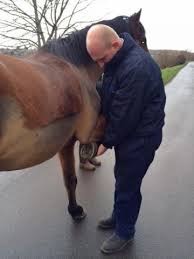The pre-purchase examination (P.P.E. or vetting) is a thorough and detailed clinical exam of the horse on behalf of the prospective purchaser in order to assess veterinary factors, which may affect the horse’s suitability for its intended purpose.
The process of vetting a horse or pony is a standardised 5-stage procedure following guidelines from the Royal College of Veterinary Surgeons and the British Equine Veterinary Association (B.E.V.A.). P.P.Es are always carried out on behalf of the purchaser with the aim of assessing factors of a veterinary nature, which could prejudice the horse's suitability for its intended use. The vet acts on behalf of the purchaser and the opinion provided is tailored to the individual purchaser’s needs and intended use for the horse. The P.P.E. provides an assessment of the horse at the time of the examination to help the potential purchaser make an informed decision on the purchase. It is not a guarantee of the horse’s suitability for its intended purpose nor a safeguard against future ailments or injuries. Points of concern raised at the time of the P.P.E. may also have bearing on future insurance policies for the horse, and this should also be considered prior to purchasing the horse.
Prior to conducting a P.P.E. it is important to make sure that the premises have a stable which can have doors closed to make it dark (to allow for the eye examination, a good flat surface where the horse can be walked and trotted, an area where the horse can be lunged (both soft and hard surfaces are required) and an area where the horse can be properly exercised e.g. a school.
The P.P.E consists of the following 5 stages:
Stage 1: Preliminary examination
This is a thorough clinical examination of the horse at rest, including performing an identification sketch, checking the horse’s passport and microchip (if present).
Stage 2: Walk and trot in-hand
This is to detect abnormalities of gait and action. Flexion tests of all four limbs and lunging on a firm surface may be performed.
Stage 3: Exercise phase
The horse is usually ridden for this phase but it may be conducted on a lunge if ridden exercise is not possible (e.g. an unbroken horse).
Stage 4: Period of rest and re-examination
The horse is allowed to stand quietly for a period. During this time the horse’s heart and lungs will be listened to again, and the limbs palpated for any swellings, which may have arisen as a result of being exercised.
Stage 5: Second trot up
The horse is trotted in-hand again to look for any signs of strains or injuries made evident by the exercise and rest stages. Flexion tests may be repeated at this stage.
Any findings and the opinion of the vet will be verbally discussed with the purchaser at the end of the examination and documented in a certificate. We advise that a full 5-stage examination is carried out prior to purchase, however we also will undertake a limited examination comprising of only the first 2 stages if specifically requested to do so. This is known as a 2 stage vetting. As part of the 2 stage vetting the potential purchaser must sign a disclaimer letter, stating that they understand the limitations of a 2 stage vetting.

A flexion test being performed as part of a vetting examination
2 stage P.P.E vs 5 Stage P.P.E.
The 5 stage P.P.E. will give you more information on the horse and any possible “faults” which it may have, thus helping you make a more informed decision prior to making the purchase, compared to a 2 stage P.P.E. As such, we would always recommend a 5 stage P.P.E where possible.
Additional Testing / Investigation
Depending on particular findings made during the P.P.E. and / or a purchaser's wishes, further examinations such as radiography, endoscopy and ultrasound scanning can be included before a final decision is reached.
We advise that appropriate insurance is taken out before purchase is made.
Blood Sample
It is recommended that a blood sample is taken. This is included in the price of our vettings. This can either be stored for 6 months and tested at a later date or tested immediately should there be suspicion that a “doping agent” may have been used to mask a particular condition.
At Central Equine Vets we carry out pre-purchase examinations on all types of horses and ponies, ranging from the family pony to elite performance horses, including those being sold abroad.
Our vets are happy to carry out PPEs on behalf registered and non-registered clients. If we know the horse the vet will request permission from the vendor for full disclosure of the horse’s clinical history to the purchaser. If the vendor denies this request our veterinary surgeon will decline to perform the PPE as he/she will not be able to act wholly in the interest of the purchaser.